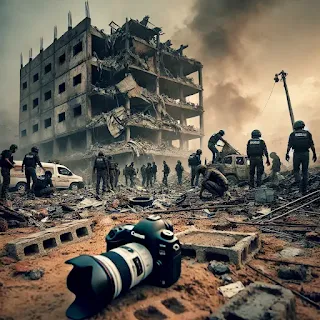Beit Lahya, Gaza Strip – An Israeli airstrike in the northern Gaza town of Beit Lahya has claimed the lives of nine Palestinians, including two journalists. The attack, which occurred amid ongoing military operations, has drawn sharp condemnation from international media organizations and human rights groups.
Targeting in Beit Lahya
The airstrike hit a residential area, reducing buildings to rubble and causing significant casualties. Among the victims were two journalists, raising concerns about press freedom and the dangers faced by reporters covering the conflict.
Eyewitnesses reported that the airstrike came without prior warning, leaving civilians with little time to evacuate. Families searched through the debris for survivors as emergency teams struggled to provide aid under dire conditions.
Condemnation and Calls for Accountability
Media watchdogs and human rights organizations have condemned the attack, calling for an independent investigation into the deaths of the journalists. The targeting of media personnel has been a recurring concern in conflicts involving Israel and Gaza, with multiple reporters killed in past military operations.
International bodies, including the United Nations, have repeatedly urged Israel to abide by international law and avoid civilian casualties. However, with the conflict intensifying, accountability remains elusive.
Ongoing Crisis in Gaza
This airstrike is part of a broader Israeli military campaign in Gaza, which has resulted in thousands of deaths and widespread displacement. The humanitarian situation continues to deteriorate, with shortages of medical supplies, food, and clean water exacerbating the suffering of civilians.
As tensions rise, calls for a ceasefire and diplomatic resolution grow louder. However, with both sides entrenched in their positions, a lasting peace remains uncertain.
The killing of journalists in war zones underscores the urgent need for greater protections for media personnel and civilians caught in the crossfire. Without accountability, the cycle of violence is likely to continue, further deepening the humanitarian crisis in Gaza.
Israeli Airstrike in Beit Lahya Kills Nine, Including Two Journalists
Beit Lahya, Gaza Strip – In a devastating escalation of violence, an Israeli airstrike in the northern Gaza town of Beit Lahya has killed nine Palestinians, including two journalists. The strike, which targeted a densely populated residential area, has intensified fears over press safety and civilian casualties in the ongoing conflict.
A Sudden and Deadly Strike
Residents reported that the airstrike came without warning, hitting a building where families had taken shelter. The impact of the blast was so powerful that it reduced homes to rubble, trapping people beneath the debris. Emergency responders rushed to the scene, working frantically to pull out survivors as smoke and dust filled the air.
Among the dead were two Palestinian journalists, who were reportedly covering the humanitarian crisis unfolding in the area. Their deaths mark another grim reminder of the perils faced by media workers in conflict zones.
International Condemnation and Calls for Investigation
Media organizations and human rights groups have strongly condemned the attack, demanding accountability for the killing of journalists and civilians. The Committee to Protect Journalists (CPJ) has urged an independent investigation into the incident, highlighting the repeated targeting of press workers in Gaza.
“The deliberate or reckless killing of journalists is a grave violation of international law,” a CPJ spokesperson said. “We call on the international community to ensure those responsible are held accountable.”
The United Nations has also voiced concern, reiterating calls for Israel to uphold its obligations under international humanitarian law. However, past calls for accountability have largely gone unanswered.
Gaza’s Worsening Humanitarian Crisis
The airstrike in Beit Lahya is part of a broader Israeli military campaign that has already left thousands dead and displaced many more. Gaza’s hospitals are overwhelmed, struggling with a lack of medical supplies and personnel. Food, water, and electricity remain scarce, exacerbating the suffering of civilians.
With no clear end to the conflict in sight, the humanitarian situation continues to deteriorate. Aid organizations warn that without immediate intervention, the crisis will deepen, leading to even more loss of life.
A Dangerous Future for Journalists in Conflict Zones
The targeting of journalists in Gaza is not new. Reporters have been frequently caught in the crossfire, making it one of the most dangerous places in the world to cover the news. International press freedom organizations have called for stronger protections for media personnel, but little progress has been made.
The deaths of these two journalists add to a growing list of reporters killed while documenting the conflict. Their loss is not only a tragedy for their families but also a blow to the world’s ability to witness and understand the realities on the ground.
As the situation in Gaza worsens, demands for an end to the violence grow louder. However, with both sides locked in a cycle of retaliation, a peaceful resolution remains elusive. The question remains: how many more lives will be lost before the world acts?

Comments
Post a Comment